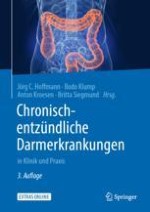2020 | OriginalPaper | Buchkapitel
3. Pathogenese chronisch-entzündlicher Darmerkrankungen
verfasst von : Britta Siegmund
Erschienen in: Chronisch-entzündliche Darmerkrankungen
Verlag: Springer Berlin Heidelberg
2020 | OriginalPaper | Buchkapitel
verfasst von : Britta Siegmund
Erschienen in: Chronisch-entzündliche Darmerkrankungen
Verlag: Springer Berlin Heidelberg
Print ISBN: 978-3-662-59103-1
Electronic ISBN: 978-3-662-59104-8
Copyright-Jahr: 2020
